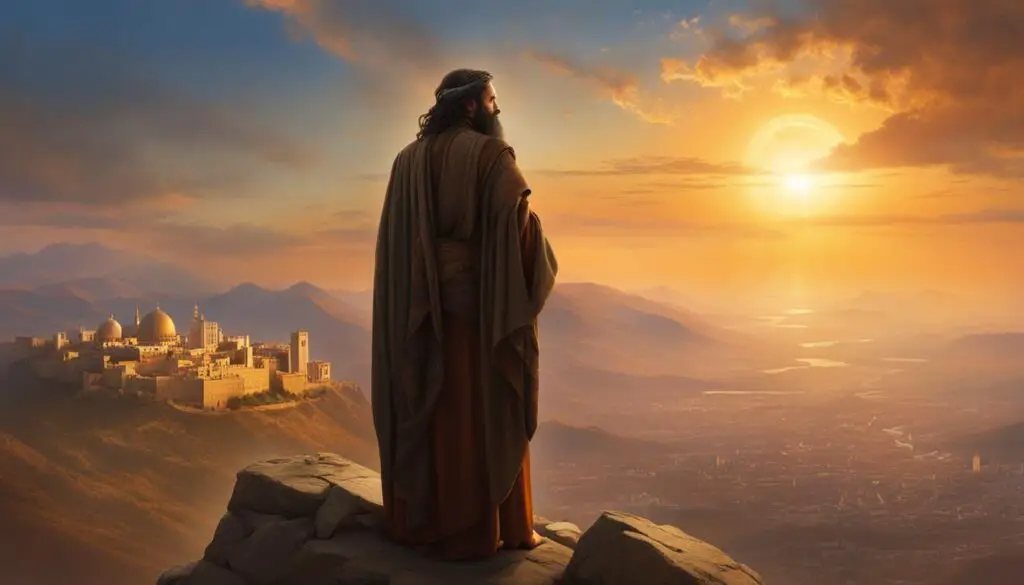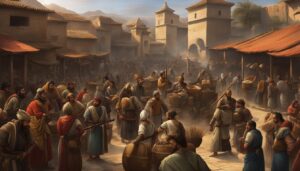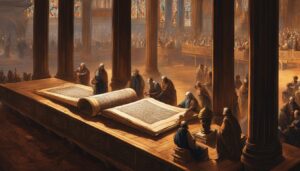
Legends and spiritual texts professing the divine powers of prophets have permeated cultures the world over since the dawn of society. The most prevalent associations with the idea of prophets originate from Judeo-Christian tradition dating back to as early as 4000 BC. But divination, prophecy and oracles are not unique to the Abrahamic religions. Ancient Mesopotamia, Egypt and Greece dabbled in these mysterious customs. They existed also among early Buddhists in China and Tibet, the indigenous peoples of the Americas, European icons, and persist still in the 21st century. Prophecy has always had societal and psychological functions, serving as a means of communication between the divine and humanity.
Key Takeaways:
- Ancient prophecies have been present in various cultures since ancient times.
- Prophets played a crucial role in the Abrahamic religions, such as Judaism, Christianity, and Islam.
- Prophecies have influenced societies, politics, and religious beliefs.
- Ancient prophecies continue to captivate people in the 21st century.
- Understanding the historical context of these prophecies provides insight into ancient civilizations.
Old Testament and Quran Prophets – 4000 BC and Onward
The Abrahamic religions – Judaism, Christianity, and Islam – have a rich tradition of prophets and prophecies. From the early Hebrew oral tradition to the written books of the Old Testament and Quran, prophets played a crucial role. Figures like Moses, Abraham, and Muhammed are considered prophets in these faiths. The prophecies in the Old Testament and Quran often revolve around divine messages, religious laws, and significant events in their respective histories.
“And I will make of you a great nation, and I will bless you and make your name great, so that you will be a blessing.” – Genesis 12:2
The Old Testament encompasses a wide range of prophecies delivered by prophets such as Isaiah, Jeremiah, and Ezekiel. These prophecies served as a means of communicating God’s will to the Israelites and foretold events such as the Babylonian exile and the eventual restoration of Jerusalem. Through these prophecies, the ancient Hebrew prophets guided the people, warned of impending judgment, and offered hope for a future redemption.
The Quran, the holy book of Islam, contains prophecies delivered by the Prophet Muhammed. These prophecies cover various aspects of religious and social life, including guidance on ethical behavior, laws, and the establishment of a just society. The prophecies in the Quran are seen as divine revelations that provide Muslims with guidance and direction in their daily lives.
Overall, the prophecies found in the Old Testament and Quran are of immense significance to believers in these religions. They serve as a source of inspiration, guidance, and hope, and continue to shape the faith and practices of millions of people worldwide.

| Prophet | Religion | Significant Prophecies |
|---|---|---|
| Moses | Judaism | Delivering the Ten Commandments, predicting the Exodus |
| Abraham | Judaism, Christianity, Islam | Being the father of a great nation, the birth of Isaac |
| Muhammed | Islam | Revelation of the Quran, establishment of a just society |
Eccentric and Classical Prophecy
In the Israelite tradition, prophets can be divided into two categories: eccentric and classical prophecies. Eccentric prophets, such as Samuel, Elijah, and Elisha, were known for their intense spiritual experiences and held significant roles in sanctuaries and monarchies. They acted as intermediaries between the divine and the people, delivering messages and guiding communities in matters of faith and governance.
On the other hand, classical prophecies emerged during tumultuous times in Israel and Judah, particularly during the neo-Assyrian Empire’s rise and the subsequent collapse of Jerusalem. The books of Isaiah and Malachi, for example, contain vivid apocalyptic premonitions and calls for the reconstruction of temples. These prophecies had a profound socio-political influence, shaping the actions of both common people and kings, and impacting religious and political order.
Classical prophecies were often characterized by their passionate exhortations, urging the people to repent, return to God, and uphold moral values. They portrayed a vision of a restored and renewed society, where justice and righteousness would prevail.
These prophecies not only addressed the immediate concerns of their respective historical contexts but also provided timeless messages of hope and guidance. They served as a moral compass for individuals and communities, reminding them of their obligations to both God and society.
The Impact of Apocalyptic Premonitions
One distinctive feature of classical prophecies was their inclusion of apocalyptic premonitions. These visions painted dramatic pictures of cataclysmic events and the ultimate triumph of good over evil. They inspired both awe and fear, calling for a serious examination of one’s actions and a response to the impending divine judgment.
The apocalyptic elements in these prophecies offered solace during times of uncertainty and upheaval, providing a sense of divine assurance that justice would be served in the end. They also instilled a sense of urgency and the need for repentance, encouraging individuals and communities to align themselves with godly principles and prepare for the future.
| Prophet | Era | Main Themes |
|---|---|---|
| Samuel | 11th century BC | Establishment of kingship, divine guidance |
| Elijah | 9th century BC | Prophetic confrontation, preservation of true worship |
| Elisha | 9th century BC | Miracles, succession of prophetic ministry |
| Isaiah | 8th century BC | Messianic prophecies, judgment, restoration |
| Malachi | 5th century BC | Corruption in religious practices, future redemption |
Conclusion
Ancient prophecies have played a significant role in shaping societies, politics, and religious beliefs across different cultures throughout history. From the ancient civilizations of Egypt, Mesopotamia, and Greece to the prophetic traditions of the Abrahamic religions, these prophecies have left a lasting impact on humanity.
These prophecies hold immense historical significance, providing invaluable insights into the beliefs and practices of ancient civilizations. They offer a glimpse into the mysticism and spiritual quests that were integral to the lives of our ancestors. As we delve into the historical context of these prophecies, we are reminded of the enduring power and fascination of the prophetic tradition.
Ancient societies interpreted, fulfilled, and celebrated these prophecies in their own unique ways. The prophecies guided the actions of kings and common people alike, shaping religious and political order. The fulfillment of these prophecies was seen as a validation of the divine connection between humanity and the supernatural realm.
Today, in the 21st century, the allure of ancient prophecies continues to captivate us. We are drawn to the mystery and wisdom they hold, seeking to decipher their meanings and interpretations. The enduring legacy of ancient prophecies serves as a testament to their enduring relevance and the timeless quest to understand the future.
FAQ
What is the historical context of ancient prophecies?
Ancient prophecies hold significance in various cultures throughout history and have shaped societies, politics, and religious beliefs.
Which religions have a rich tradition of prophets and prophecies?
The Abrahamic religions – Judaism, Christianity, and Islam – have a rich tradition of prophets and prophecies.
Who are some famous prophets in the Abrahamic religions?
Figures like Moses, Abraham, and Muhammed are considered prophets in Judaism, Christianity, and Islam.
What are eccentric and classical prophecies in the Israelite tradition?
Eccentric prophets like Samuel, Elijah, and Elisha were consumed by spiritual experiences, while classical prophecies, found in books like Isaiah and Malachi, contained vivid apocalyptic premonitions and calls for the reconstruction of temples.
How have ancient prophecies influenced societies and beliefs?
Ancient prophecies have played a role in shaping societies, politics, and religious beliefs. They have been interpreted, fulfilled, and celebrated by different civilizations throughout history.
What insights can we gain from the historical context of prophecies?
The historical context of prophecies provides invaluable insights into the beliefs and practices of ancient civilizations, reminding us of the enduring power of the prophetic tradition.








